 Algonquin Book
Club
Algonquin Book
Club  Algonquin Book
Club
Algonquin Book
Club
Previously
read:
Thoughts from our members: (Comments are welcome)
| September 2012 | 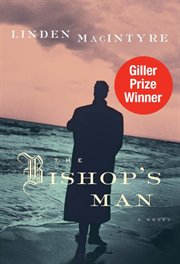 |
The Bishop’s Man, by Linden MacIntyre |
| August 2012 |  |
Half Blood Blues, by Esi Edugyan |
| July 2012 | 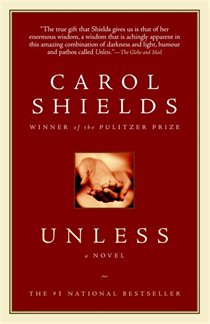 |
Unless, by Carol
Shields A seemingly simple story, this novel asks some very provocative questions about equality, or relativity - one thing, one person, relative to another. The 'train-of-thought' writing style is very relatable. |
| June 2012 | 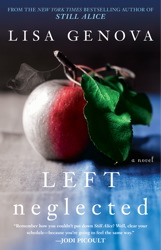 |
Left neglected, by Lisa Genova |
| May 2012 | 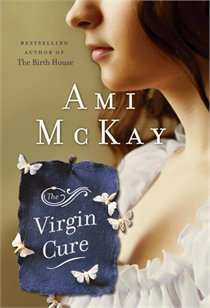 |
The Virgin Cure, by Ami
McKay An astonishing insight into the world of early New York City. With the lack of social services for the poor, a young girl turns in desperation to the only path she sees to a better life. This path is veiled in kindness and prosperity, but ultimately reveals its true nature. |
| April 2012 |  |
Shelf Monkey, by Corey Redekop A wild, fast paced read that makes deep, humourous cuts to the world of pop literature.
|
| March 2012 |  |
To Kill a Mockingbird, by Harper Lee Compassionate, dramatic, and deeply moving, To Kill A Mockingbird takes readers to the roots of human behavior - to innocence and experience, kindness and cruelty, love and hatred, humor and pathos. Now with over 18 million copies in print and translated into forty languages, this regional story by a young Alabama woman claims universal appeal. Harper Lee always considered her book to be a simple love story. Today it is regarded as a masterpiece of American literature. |
| February 2012 |  |
The Twentieth Wife by Indu Sundaresan Skillfully blending the textures of historical reality with the rich and sensual imaginings of a timeless fairy tale, The Twentieth Wife sweeps readers up in the intrigue of the Mughal Empire, and in the bedazzling destiny of a woman -- a legend in her own time -- who was all but lost to history until now. |
| January 2012 |  |
The Stone Carvers by Jane Urquhart Spanning three decades, and moving from a German-settled village in Ontario to Europe after the Great War, The Stone Carvers follows the paths of immigrants, labourers and dreamers. Vivid, dark, redemptive, this is a novel of great beauty and power. |
| November 2011 |  |
The Sheep Look Up by John Brunner (1972) |
| October 2011 |  |
Sarah’s Key by Tatiana de Rosnay Tatiana de Rosnay offers us a brilliantly subtle, compelling portrait of France under occupation and reveals the taboos and silence that surround this painful episode. |
| September 2011 |  |
Room by Emma Donoghue Told entirely in the inventive, often funny voice of Jack, Room is a celebration of the resilient bond between parent and child, and a brilliantly executed novel about a journey from one world to another. |
| August 2011 | 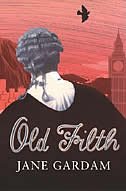 |
Old Filth, by Jane Gardam Brilliantly constructed - going backwards and forwards in time, yet constantly working towards the core of the man- OLD FILTH is funny and heart-breaking, witty and peopled with characters who astonish, dismay and delight the reader. Jane Gardam is as sensitive to the 'jungle' within children as she is to the eccentricities of the old. |
| July 2011 |  |
Island Beneath the Sea, by Isabel Allende This is an epic work of historical fiction, which slowly unravels the circumstances of the slave revolt in what is now Haiti. The author gives a wonderful insight into the minds and reasoning of the slave owners, exposing their behavior in the context of their time.
The writing however, is somewhat plain (is this because it's translated from Spanish?) and without a sense of poetry, which a novel of this length sorely needs. |
| June 2011 |  |
The Help, by Kathryn Stockett In pitch-perfect voices, Kathryn Stockett creates three extraordinary women whose determination to start a movement of their own forever changes a town, and the way women-mothers, daughters, caregivers, friends-view one another. A deeply moving novel filled with poignancy, humor, and hope, The Help is a timeless and universal story about the lines we abide by, and the ones we don't. |
| May 2011 | 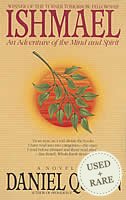 |
Ishmael, by Daniel Quinn The narrator of this extraordinary tale is a man in search for truth. He answers an ad in a local newspaper from a teacher looking for serious pupils, only to find himself alone in an abandoned office with a full-grown gorilla who is nibbling delicately on a slender branch. "You are the teacher?" he asks incredulously. "I am the teacher," the gorilla replies. Ishmael is a creature of immense wisdom and he has a story to tell, one that no other human being has ever heard. It is a story that extends backward and forward over the lifespan of the earth from the birth of time to a future there is still time save. Like all great teachers, Ishmael refuses to make the lesson easy; he demands the final illumination to come from within ourselves. Is it man's destiny to rule the world? Or is it a higher destiny possible for him-- one more wonderful than he has ever imagined? |
| April 2011 | 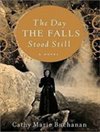 |
The Day the Falls Stood Still, by Cathy Marie Buchanan Set against the tumultuous backdrop of Niagara Falls, at a time when daredevils shot the river rapids in barrels and great industrial fortunes were made and lost as quickly as lives disappeared. |
| March 2011 | 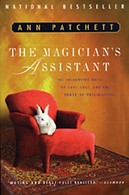 |
The Magician's Assistant, by Ann Patchett The Magician's Assistant is fun, endearing, kind, and moving; it expertly explores new territory in the complex search for love. |
| February 2011 |  |
The Elegance of the Hedgehog, by Muriel Barbery This brilliant work is influenced by Tolstoy's Anna Karenina, and stands on its own as a great work of literature. For those seeking beauty in small things. |
|
January 2011
|
 |
Late Nights on Air, by Elizabeth Hay A somewhat slow and meandering lead up to an unbelievable canoe trip leaves the reader disappointed. Characters are not full or interesting. The book is redeemed by the moments of beauty experienced in the descriptions of the landscape and the historical value of the debate over the Mackenzie River pipeline project. |
|
November 2010 |
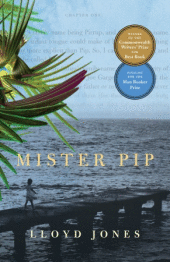 |
Mister Pip, by Lloyd Jones |
| Ocotober 2010 | 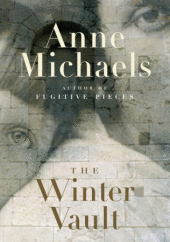 |
The Winter Vault, by Anne Micheals |
| September 2010 |  |
The Gargoyle, by Andrew Davidson |
| August 2010 | 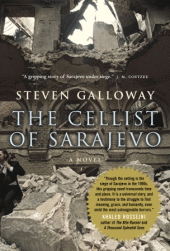 |
The Cellist of Sarajevo, by Steven Galloway |
| July 2010 |  |
The Glass Castle, by Jeannette Walls |
| June 2010 | 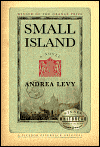 |
Small Island, by Andrea Levy |
| May 2010 | 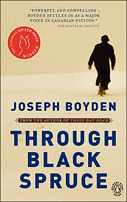 |
Through Black Spruce, by Joseph Boyden
|
| April 2010 | 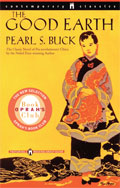 |
The Good Earth, by Pearl S. Buck This is a universal story of the nourishing power of the land. The connection to the land, which is the fundamental source of wealth, is associated with moral piety, good sense, respect, and work ethic. And yet the status of those who work the land is the lowest. Increased wealth and modernization leads to alienation from the land, and the class differences that arise is the is source of conflict in human societies. And so, the cyclical nature of growth and death becomes a metaphor for human activites. The oppression of women is another major theme in this novel. The socio-economic role of women is tragically overlooked in most cultures. The value of women is obfuscated by the sexual and romantic ideals that are placed on them by men, and these values are not outrightly rejected by women, since their own status in society is at stake. Highly recommended. |
| March 2010 | 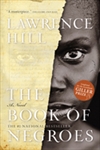 |
The Book of Negroes, by Lawrence
Hill |
| February 2010 |  |
The Girls, by Lori Lansens Lansens manages to bring two authentic voices to this fictional autobiographical story of craniopagus twins. Instead of a story centred on the deformity, we get a picture of two normal individuals that are forced to cope with and celebrate their conjoinment. Themes of conjoinment and marginalisation run through the entire novel and are explored through the supporting characters. |
| January 2010 | 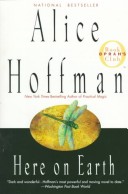 |
Here on Earth, by Alice Hoffman This story follows much of the plot of 'Wuthering Heights', but falls short of the classic's scope and depth. Although there are moments of genuine insight and some beautifully descriptive passages, the reader is left wanting more from the characters. Hoffman's examination of the nature of love and relationships is well done, although limited in this novel to the dysfunctional.
|
| November 2009 | 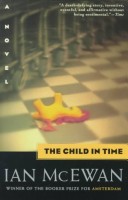 |
The Child in
Time, by Ian McEwan
A sense of loss pervades this fine, provocative novel by the author of The Comfort of Strangers. The protagonist, Stephen Lewis, a successful author of children's books, is introduced to us in a scene more frightening than any from a horror novel: while he is shopping with Kate, his three-year-old daughter, the child is kidnapped. Stephen's mounting terror as he combs the store for Kate trying in vain to recall the face of the dark-clad stranger he glimpsed behind them is palpable. As the story moves forward, it focuses not only on Stephen's search for his daughter, but also on his attempts to come to terms with his loss and the likely collapse of his marriage to Julie, a musician. Woven through the narrative is a subplot that deals with childhood and loss of a different sort. It is the innocence of youth that Stephen's friend and former editor, Charles Darke, longs for and ultimately recaptures at a terrible price. This is a beautifully rendered, very disturbing novel. |
| October 2009 | 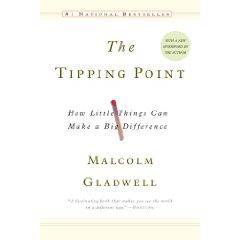 |
The Tipping
Point, by Malcolm Gladwell
The best way to understand the dramatic transformation of unknown books into bestsellers, or the rise of teenage smoking, or the phenomena of word of mouth or any number of the other mysterious changes that mark everyday life," writes Malcolm Gladwell, "is to think of them as epidemics. Ideas and products and messages and behaviors spread just like viruses do." Although anyone familiar with the theory of memetics will recognize this concept, Gladwell's The Tipping Point has quite a few interesting twists on the subject. |
| September 2009 |  |
Snow Flower and the
Secret Fan, by Lisa See A revelatory look into the lives of women in pre-revolutionary China. This is a story about friendship and looking beyond what is expected by one's culture. |
| August 2009 | 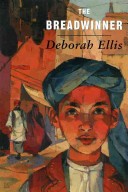 |
The
Breadwinner, by Deborah Ellis The story of a little hero, whos struggle against the injustices of the Taliban give child and adult readers alike a very hopeful and unbiased picture of recent events in Afghanistan. |
| June 2009 | 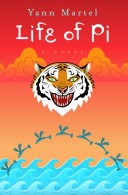 |
Life of Pi,
by Yann Martel Interpretations of this story are as varied as the people that read it. Believers in God will likely see it very differently than athiests, and perhaps this is the point. I see the novel as a wonderfully imaginative exploration of existentialism. Whatever you make of it, it's an excellent book. The story itself is so wildly incredible, yet somehow completely believable. |
| May 2009 | 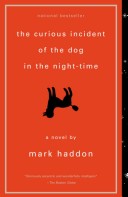 |
The Curious Incident
of the Dog in the Night Time, by Mark Haddon Christopher is fifteen and has Asperger's, a form of autism. He knows a very great deal about maths and very little about human beings. He loves lists, patterns and the truth. He hates the colours yellow and brown and being touched. He has never gone further than the end of the road on his own, but when he finds a neighbour's dog murdered he sets out on a terrifying journey which will turn his whole world upside down. Christopher is a brilliant creation, and Mark Haddon's depiction of his world is deeply moving, very funny and utterly convincing. |
| April 2009 | 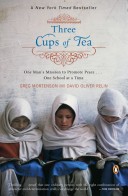 |
THREE CUPS OF TEA:
One Man?s Mission to Promote Peace . . . One School at a Time, by
Greg Mortenson and David Oliver Relin
Do you know anyone who would be willing to sell everything they own and live in their car just so they could save every dollar for someone else? Greg Mortenson, a great American hero, did just that when he followed through on his promise to an impoverished Pakistani village to build a school for its children, and in the process has found himself playing a major role in one of the most historically and culturally pivotal areas in the world today. Greg Mortenson, and acclaimed journalist David Oliver Relin, recount the unlikely journey that led Mortenson from a failed attempt to climb Pakistan?s K2, the world?s second highest mountain, to successfully building schools in some of the most remote regions of Afghanistan and Pakistan. By replacing guns with pencils, rhetoric with reading, Mortenson combines his unique background with his intimate knowledge of the third-world to fight terrorism with books, not bombs, and successfully bring education and hope to remote villages in central Asia. THREE CUPS OF TEA is at once an unforgettable adventure and the inspiring true story of how one man really is changing the world?one school at a time. |
| March 2009 | 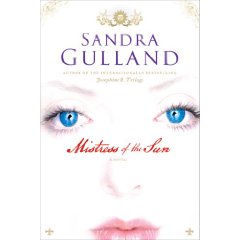 |
Mistress of the
Sun, by Sandra Gulland
The author of the internationally acclaimed Josephine B. trilogy returns with another deeply enchanting historical novel, this one based on the life of an extraordinary horsewoman, Louise de la Valli?re, the brave and spirited child of minor nobility who, against all odds, grows up to become one of the most mysterious consorts of France's King Louis XIV, the charismatic Sun King. Set against the magnificent decadence of the 17th-century court of the Sun King, Mistress of the Sun begins when the eccentric young Louise falls in love with a wild white stallion and uses ancient magic to tame him. This one desperate action of youth shadows her throughout her life, changing it in ways she could never imagine. Unmarriageable and too poor to join a convent, she enters the court of the Sun King as a maid of honour, where she captures - and then tragically loses - the King's heart. Mistress of the Sun illuminates, through the resurrection of a fascinating female figure from the dark corners of history, both the power of true love and the rash actions we take to capture and tame it. Sandra Gulland's previous work brought Josephine Bonaparte magnificently to life in three immediately addictive bestselling novels. Beginning with The Many Lives & Secret Sorrows of Josephine B., Gulland established an entirely new gold standard for the art of historical fiction. |
| February 2009 | 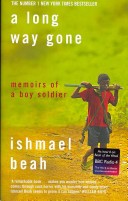 |
A Long Way Gone -
Memoirs of a Boy Soldier, by Ishmael
Beah A brutal story of stolen childhood and a country torn apart. Ishmeal is an amazing example of how powerful and important kindness and forgiveness are in creating a place where we can live in peace. Thank you to UNICEF for creating programs that help these kids. |
| January 2009 |  |
October, by Richard B.
Wright Sparse, yet smooth writing tells a small, intimate story. |
| November 2008 |
|
Can You Hear the Nightbird Call, Anita Rau
Badami Discussion Questions |
| October 2008 |  |
One Hundred Years of
Solitude, by Gabriel Garcia Marquez This is a dense literary epic, and is sometimes confusing and difficult. Written in the style of 'magical realism', it seeks to illuminate the deep sadness of those that are forced into solitude from the rest of the world. It is representative of the struggle of Latin American culture. |
| September 2008 |  |
A Thousand Splendid
Suns, by Khaled Hosseini Khaled Hosseini's beautiful writing bring us into the world of two young Afghan women who's fates mirror that of Afghanistan itself. |
| August 2008 |
|
A Piece of Cake, by Cupcake
Brown There are shelves of memoirs about overcoming the death of a parent, childhood abuse, rape, drug addiction, miscarriage, alcoholism, hustling, gangbanging, near-death injuries, drug dealing, prostitution, or homelessness. Cupcake Brown survived all these things before she'd even turned twenty. And that's when things got interesting.... You have in your hands the strange, heart-wrenching, and exhilarating tale of a woman named Cupcake. Cupcake Brown is a wonder. What happened to her is a shame to us all, and should serve as a lesson in not looking the other way. That she survived and thrived is testament to her indominatable character. |
|
June
|
 |
Light at the Edge of
the World, by Wade Davis The primary message in this book is how cultures vary with their environments. Worldwide, Davis notes, only about five per cent of humanity live in areas relatively untouched by European intrusion. They are scattered, often living in what we deem as "savage" or "desolate", yet they survive and flourish when allowed. Hardly rigid in outlook, these people have learned well how to adapt to changing conditions. They have come to know just how to deal with what Nature has provided. Centuries of experience are put to use on a daily basis, following seasonal and other variations - a long-accumulated wisdom that this world stands much in need of. If you can, get the pictorial version. There is also a non-pictorial edition. Interview with Wade Davis, by Philip Coulter Discussion Questions |
|
May
|
 |
Water for
Elephants, by Sara Gruen An atmospheric, gritty, and compelling novel of star-crossed lovers, set in the circus world circa 1932, by the bestselling author of "Riding Lessons." When Jacob Jankowski, recently orphaned and suddenly adrift, jumps onto a passing train, he enters a world of freaks, drifters, and misfits, a second-rate circus struggling to survive during the Great Depression, making one-night stands in town after endless town. A veterinary student who almost earned his degree, Jacob is put in charge of caring for the circus menagerie. It is there that he meets Marlena, the beautiful young star of the equestrian act, who is married to August, the charismatic but twisted animal trainer. He also meets Rosie, an elephant who seems untrainable until he discovers a way to reach her. Beautifully written, "Water for Elephants" is illuminated by a wonderful sense of time and place. It tells a story of a love between two people that overcomes incredible odds in a world in which even love is a luxury that few can afford. Disussion Questions |
|
April
|
 |
Eat, Pray, Love, by
Elizabeth Gilbert This beautifully written, heartfelt memoir touched a nerve among both readers and reviewers. Elizabeth Gilbert tells how she made the difficult choice to leave behind all the trappings of modern American success (marriage, house in the country, career) and find, instead, what she truly wanted from life. Setting out for a year to study three different aspects of her nature amid three different cultures, Gilbert explored the art of pleasure in Italy and the art of devotion in India, and then a balance between the two on the Indonesian island of Bali. By turns rapturous and rueful, this wise and funny author (whom "Booklist" calls Anne Lamotts hip, yoga- practicing, footloose younger sister) is poised to garner yet more adoring fans. Discussion Questions |
|
March
|
 |
The Pact, by Jodi
Picoult In this contemporary tale of love and friendship, Jodi Picoult brings to life a familiar world, and in a single terrifying moment awakens every parent's worst fear: We think we know our children? but do we ever really know them at all? to read more... Discussion Questions |
|
February 2008
|
|
Major Themes in Three
Day Road by Joseph Boyden (Discussed by ABC Book Club
members on Feb. 7, 2008) By Vijay
War: The author takes us deep into the horrors of World War 1. Boyden paints many grotesque scenes, with macabre details of mud, lice, trenches, tunnels and rotting dead bodies. The author?s father, his uncle and his maternal grandfather had all served in different Wars, and he draws on some of their experiences, and the Canadian war hero, Francis Pegahmagabow, served as an inspiration. The two Cree Indian friends- Elijah and Xavier -serve in W.W.1- in the most brutal and horrifying warfare. He portrays the chaos, fear, cowardice and courage of the infantrymen, in a heart-wrenching manner. Elijah is most successful in killing as many as 356 of enemy- soldiers, and as his reputation grows, and his vanity is fed, he becomes obsessed with killing and becomes possessed by demonic powers (Windigo). He even kills some of his own people: Gray Eyes and Lt. Breech for some false accusations made against him. Quite simply, he reaches a state of moral dissipation. Xavier, on the other hand, although he discharges his duty, has a spiritual revulsion of killing. The contrast between the two is very significant. Xavier?s mother gave him up to a Residential School, but fortunately, his Aunt, Niska kidnaps him out of that School, and raises him with traditional Native values. Elijah is forcefully put into a Residential School, and suffers all forms of abuse under the Catholic monks and nuns, ands so he is ?corrupted by their education.? Consequently, as the war progresses, he is gripped with a kind of madness, and he goes too far, beyond the bounds of permitted aspiration, set by the Gods. In a most poignant climactic scene, when Elijah is wounded, he asks his friend to ?do what you have to.? Xavier kills Elijah, partly to alleviate his pain and misery (mercy killing) and partly also to exorcise the evil which had gripped his soul. Destruction of harmony and
the re-establishment of harmony: Xavier returns from the war, with a
serious morphine addiction and a real disability (Loss of one leg).He is
physically damaged, emotionally scrambled and spiritually exhausted.
Niska, his aunt, tries to cure him with herbal medicines, songs, stories
and natural warmth and affection. Niska is a proud, strong woman who did
not give up in a time of family and cultural upheaval. She evokes the
powers of Gods, Nature, Natural Seasons, Natural cycles, and asks them for
forgiveness and healing (especially for Xavier?s killing of Elijah). Pain,
anger, fear and confusion are replaced with serenity and tranquility in
Niska?s grand vision. Niska looks down from heaven and sees Xavier, his
wife and their two boys enjoying their childhood in perfectly serene and
natural surroundings. Thus, destruction of harmony is embodied by war, by
dislocation, by abuse, by discrimination and re-establishment of harmony
is symbolized by ?sounds of night animals,? ?fox and the marten,? ?the
lynx,? and ?the sky and the river.? The narration starts at the end,
traces through the circle around and ends where it started. The reader
feels a sense of participation in Xavier and Niska?s reflection,
confession, cleansing and healing. (Vijay, ABC
member) |
|
January 2008
|
 The Many Lives and Secret
Sorrows of Josephine B., Sandra Gulland (local
author) The Many Lives and Secret
Sorrows of Josephine B., Sandra Gulland (local
author) |
An amazing tale of profound historical drama. These novels comprise the definitive history of the French Revolution which unfolds through the eyes of its beloved heroine. Look for other titles in this trilogy: |
| October
2007 |
 La
Prisonierre La
PrisonierreAuthor: Malika Oufkir, 2001 Meeting: November 1 Discussion questions |
Vijay?s thoughts on La Prisonniere
by Malika Oufkir
Malika Oufkir?s La Prisonniere evokes the sympathy in the reader for the cruelty, injustice, hardships, isolation, brutality and deprivation and torment endured by Malika and her family. We admire their courage, imagination, determination and ingenuity. This is a harrowing story , filled with pain, sorrow and anguish, only redeemed by the uplifting ending, which returns the family to freedom and civilization, although they might be irreparably scarred . Like many books, it has certain limitations. The historical context of various situations is not made clear. The prose is stern, harsh, unyielding and uncompromising, and this could be deliberate, considering the very dark contents of the story. The emotional power of the book is somewhat marred by a rather tepid, lukewarm, detached presentation, and the strong beliefs and convictions of the author are poorly articulated. The triumph of the human spirit is a classical theme, which needs to be clothed in a powerfully moving and evocative prose, endued with enormous warmth, passion and compassion. Vijay ( Comments welcome ) |
| September
2007 |
The
Red Tent |
A more human and feminine telling of
the story of the biblical family of
Jacob. |
|
August
2007
|
The Memory Keeper's
Daughter
|
Vijay?s thoughts on The
Memory Keeper?s Daughter by Kim Edwards (Discussed by Algonquin Book
Club on Thursday, Sept. 6, 2007)
Main Themes 1. The burden of secrets. (David?s, Norah?s, Caroline?s)
396- Paul wondered ?how his father could have betrayed her (Norah), betrayed them all.? Paul and Norah must forgive David and let go of their ?righteous anger.?
8. ?What kind of life is worth living?? A. Must understand one?s identity. B. Must strive towards self-fulfillment. C. Must strive to be ourselves at our best. (honour one?s values, principles, beliefs) D. Must have focus, meaning, purpose and significance. 9. Vision of Innocence. (Simplicity is the watchword. Don?t complicate your life) 395. ?She (Phoebe) seemed not to worry very much about things, but rather to accept the world as a fascinating and unusual place where anything might happen.? 390. ?He (Paul) realized, with a deep sense of shame, that his pity for Phoebe, like his mother?s assumption of her dependence, had been foolish and unnecessary. Phoebe liked herself and she liked her life; she was happy. All the striving he had done, all the competitions and awards, the long and futile struggle to both please himself and impress his father?placed next to Phoebe?s life, all that seemed a little foolish too. ? 10. Acceptance. At the end of David?s hungry searching and his ?intricate and exhausting task of trying to transform the world into something else, to turn the body into the world, and world into the body,? he finally came to this simple conclusion: ?You can?t stop time. You can?t capture light. You can only turn your face up and let it rain down.? (319)
(Comments by other Algonquin Book Club members, most welcome. Vijay)
|
|
July 2007 |
Difficult to get through. Post-modern style, non-linear without plot. Beautiful poetic writing that must be carefully examined. | |
|
June 2007 |
| |
|
May 2007 |
Generally agreed that this is modern
classic. A very atypical story that might take the reader by
surprise. Perfume is a brilliant, engaging and evocative novel. It has elements of a fable, an allegory and a Gothic novel. A Fable is a story with a moral. If we consider just the barebones of the story of Grenouille, it is easy to see the following morals: Being deprived of love, security, attention and tenderness as a child, Grenouille used his unique olfactory gifts and creative imagination in a rather perverse manner and became an exotic monster. Childhood experiences leave an indelible impression on the psyche of an individual. Obsessed with creating the most perfect perfume, with no
regard for any ethics or humaneness, Grenouille's quest results in a
meaningless perfection. The author implies, by this example that an
undeniably inhumane core lies at the centre of the 18th Century's
aspiration to greatness. The book is a satire on the Eighteenth Century,
France. Grenouille is described by the author as ghost or angel,a
supernatural being, angel of a man, In any case, he is a frenzied and
alluring FORCE in the novel. Even the cannibals, who dismember him and eat
parts of his body, do so with the belief of wanting "a spark from that
wonderful fire". The concluding sentence in the novel is: "For the first
time they had done something out of love." In the novel, the author describes vividly the foul stench in and around Paris, in the opening paragraphs (pp 3-5). From the peasant to the aristocracy to the King and Queen, everyone stank. Everywhere, there was disease, poverty, degradation and squalor. Therefore, there was an abysmal chasm between the glorious Promise and its very disappointing results, in the Eighteenth Century. Grenouille's quest for the most exquisite perfume is symbolic of the growth and development of the Enlightenment's spirit and ideals. If you aspire for greatness, for perfection, for flawlessness, at any cost, you become undeniably inhumane and unethical. In fact, Grenouille, despite his heinous crimes, fell short of the Age's arrogance, misanthropy, immorality and wickedness.(p.3). The author says that the Age was replete with "the most gifted and abominable personages." (p.3) The culminating scenes in the novel, in which the mob goes into orgiastic, wild and riotous chaos under the influence of Grenouille's magic perfume and the subsequent scene in which the Cannibals as an act of love, dismember him and eat him (to get a spark from that wonderful fire) are symbolic of the complete disintegration of a society, all in the name of attaining the "Higher Principle". Gothic elements. Most Gothic novels are tales of mystery and horror, intended to chill the spine and curdle the blood. They have passion, bloodshed and villainy. They have strong supernatural elements. Some of these elements are undeniably present in 'Perfume'. Grenouille does have supernatural powers. However, the novel falls much short of the theatrical, sensational and melodramatic aspects of a Gothic novel. The author's prose is, in fact, restrained, dignified and aesthetic. Style of
Writing: The translator, John E. Woods must be complimented for his
seductive, mesmerizing and aesthetic expression throughout the novel. Here
are a couple of his aphoristic gems: The metaphor of the Tick for Grenouille is very appropriate. "the ugly little tick which by rolling its blue-gray body up into a ball offers the least possible surface to the world". Like a tick he can remain inconspicuous when he chooses, drop into society at will, and "drop and scratch and bore and bite into that alien flesh". (21) Elegant Variations: Like most Classical writers, the author uses elegant variations to reiterate and reinforce certain ideas. For example, Baldini's condescending attitude to Grenouille is expressed in this manner: "little deformed person", (70) "lump of humankind", (72) "the toad",(74) "the gnome face", (75) "the spider", (76) "shrivelled pile of trash",(82) "beastly, cheeky, snot-nosed brat",(82) "the cipher of a man".(90) and "sanctimonious loathing".(108) Parallel Structure: When identical grammatical units are used in sequence, such a rhetorical device is called Parallel Structure. It is a powerful, effective and unified way of communicating ideas. Most often, Classical writers use this device in a compelling and persuasive manner. The author/ translator uses this magnificent device in a consummate manner. Examine the following brilliant passage: "Grenouille stood there and smiled. Or rather it seemed to the people who saw him that he was smiling, the most innocent, loving, enchanting, and at the same time most seductive smile in the world. But in fact it was not a smile, but an ugly, cynical smirk that lay upon his lips, reflecting both his total triumph and his total contempt. He, Jean Baptiste Grenouille, born with no odour of his own on the most stinking spot in the world, amid garbage, dung, and putrefaction, raised without love, with no warmth of a human soul, surviving solely on impudence and the power of loathing, small, hunchbacked, lame, ugly, shunned, an abomination within and without- he had managed to make the world admire him. To hell with admire! Love him! Desire him! Idolize him!" (239)
The author/translator uses this and other literary devices in the novel to create a dignified aesthetic impression. In short, Perfume is a Classic. | |
|
April 2007 |
| |
| March 2007 | Author: Khaled Hosseini |
A captivating and deeply moving story. The first Afghan writer to be published in North America, this novel provides a keen insight to the nation's tragic fate. |
| February 2007 | Mind
Set! Author: John Naisbitt, 2006 |
|
| January 2007 | The
Birth House Author: Amy McKay, 2006 |
|
| November 2006 | Light on
Snow Author: Anita Shreve, 2004 |
|
| October 2006 | Before You Know
Kindness Chris Bohjalian |
|
| September 2006 | The Lovely
Bones Alice Sebold |
|
| August 2006 | Never Let Me
Go Kazuo Ishiguro |
|
| July 2006 | Deafening Frances Itani |
|
| June 2006 | The Da Vinci
Code Dan Brown |
|
| May 2006 | A Complicated
Kindness Miriam Towes |
Fresh, honest prose, in the voice of a sixteen-year-old girl, gives insight to the realities and reasoning behind Menno-ism, and to the nature of deprivation. |